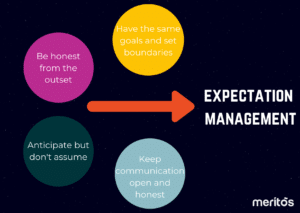Have you ever managed up? It’s not a term we often use or a skill we usually develop but managing up or managing your boss is important and can transform your working environment.
So, what exactly is managing up?
According to the Harvard Business Review, managing up is being the most effective employee you can be by creating value for your boss and your company.
But is this really your job? Is it really necessary to manage yourself, your team and now your boss? Managing up is definitely not sucking up. It is learning what makes your boss tick, understanding their needs and requirements, showing you care and meeting performance goals and KPIs. Not only will this improve your manager’s work life, but it will develop a healthy and positive relationship, increase your job satisfaction, and potentially elevate your career.
We’ve developed seven powerful but simple strategies to transform how you manage up.
1. Understand your boss
Understanding another human is a fundamental skill. It helps us to predict how someone might feel or act in certain situations and share their experiences. In terms of your boss or manager, this means understanding their core responsibilities, what they are held accountable for and their priorities. Knowing these important pieces of information will help form your own priorities and what issues or risks are worth raising. It will also help you take initiative and to anticipate their needs.
2. Understand yourself
Self-awareness is key in many life situations and managing up is no different. Plus, your boss or manager is only one half of the equation, you need to factor yourself in too. Spend time understanding and developing your work styles, your strengths and weaknesses and make sure you address your needs for an optimal working environment. Things won’t always go smoothly or your way, and this is normal for any relationship, but understanding how your personality plays into the dynamic with your boss is an important part of the equation.
3. Discover your boss’ expectations
Critical to any working relationship is expectation management. Mismanaging expectations can cause trust and confidence issues. Discovering your boss’ expectations provides you with an opportunity to not only meet them but address them if they’re unrealistic or not feasible. A great example is when you propose to your boss that you will have the project completed in 10 days but finish it in seven – you gain hero status. However, if you promise to deliver the project in five days but take seven – you have failed. Both situations took seven days but your boss’ expectations were not managed the second time.
4. Develop and manage a relationship with your boss
Now that you have established expectations and have a greater understanding of your boss and yourself, it is important to develop and manage your relationship with them. Basically, establish a way of working that suits both of you. If your boss prefers memos over meetings but you thrive on face-to-face then explore ways where this achievable. For example, sending through a memo then requesting a quick follow-up to discuss. Finding compatibility in your work styles will not only ensure your relationship is positive and productive but will increase your job satisfaction. Effective communication is also key to developing this relationship.
5. Use of time and resources effectively
Your boss, like yourself, will only have a certain amount of time, resources and energy to dedicate to particular projects or issues. Ensuring you are maximising your time with them efficiently and not raising trivial issues will further strengthen your relationship. It may help to carve out a time once a week when you both know there is a dedicated opportunity to catch up on your work or issues.
6. Be dependable and honest
Being dependable and honest are fundamental characteristics of a great employee. These traits reveal integrity and gain trust and respect from your peers and most importantly your boss. It is something we ultimately strive for, but complex relationships can impact our dependability and our honesty. For example, playing down an issue to protect yourself could create a problem in the future. It may have been easier at the time to skirt the issue, but it ultimately causes trust issues later.
7. Manage the information flow
Not every boss needs the same amount of information or has capacity to sit down to hear about your daily workload. Understanding how your boss likes to receive updates is important to not overwhelming them with trivial or too much information. Plus, it creates consistency when you have an established information flow. For example, a Monday morning WIP or daily afternoon downloads.
Further, if you have multiple managers or key people you work for, these seven strategies will apply to them all, which could seem overwhelming. However, doing the groundwork and understanding how each person ticks, will save you time later. It is also important to keep in mind that not all relationships will run smoothly, despite your best efforts. Managing up is all about being the most effective employee you can be and creating value for your boss but from time-to-time there may be outside influences that impact on this. Ultimately, success and a positive and healthy working relationship with your boss is all about doing your job and doing it well.
















